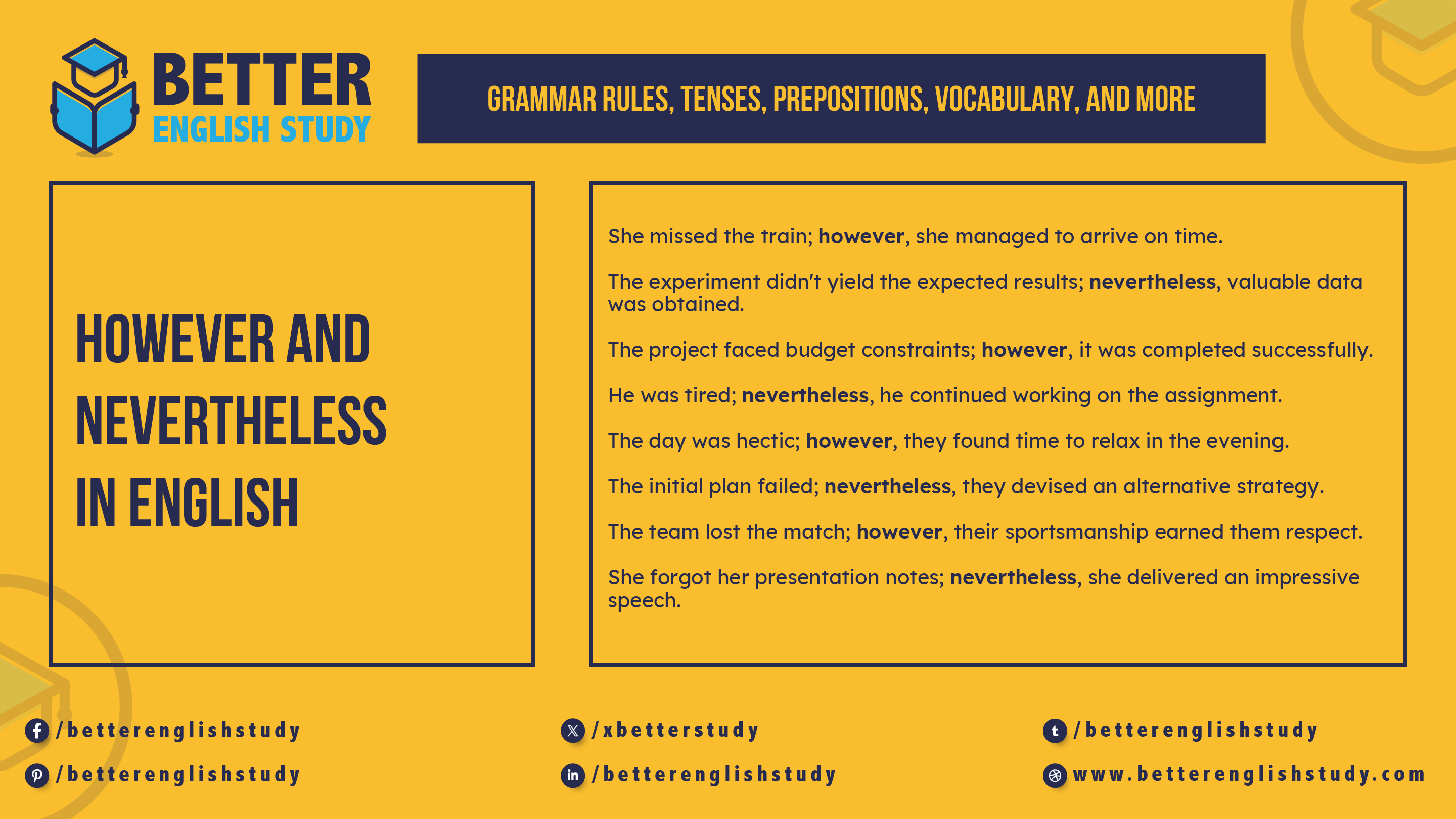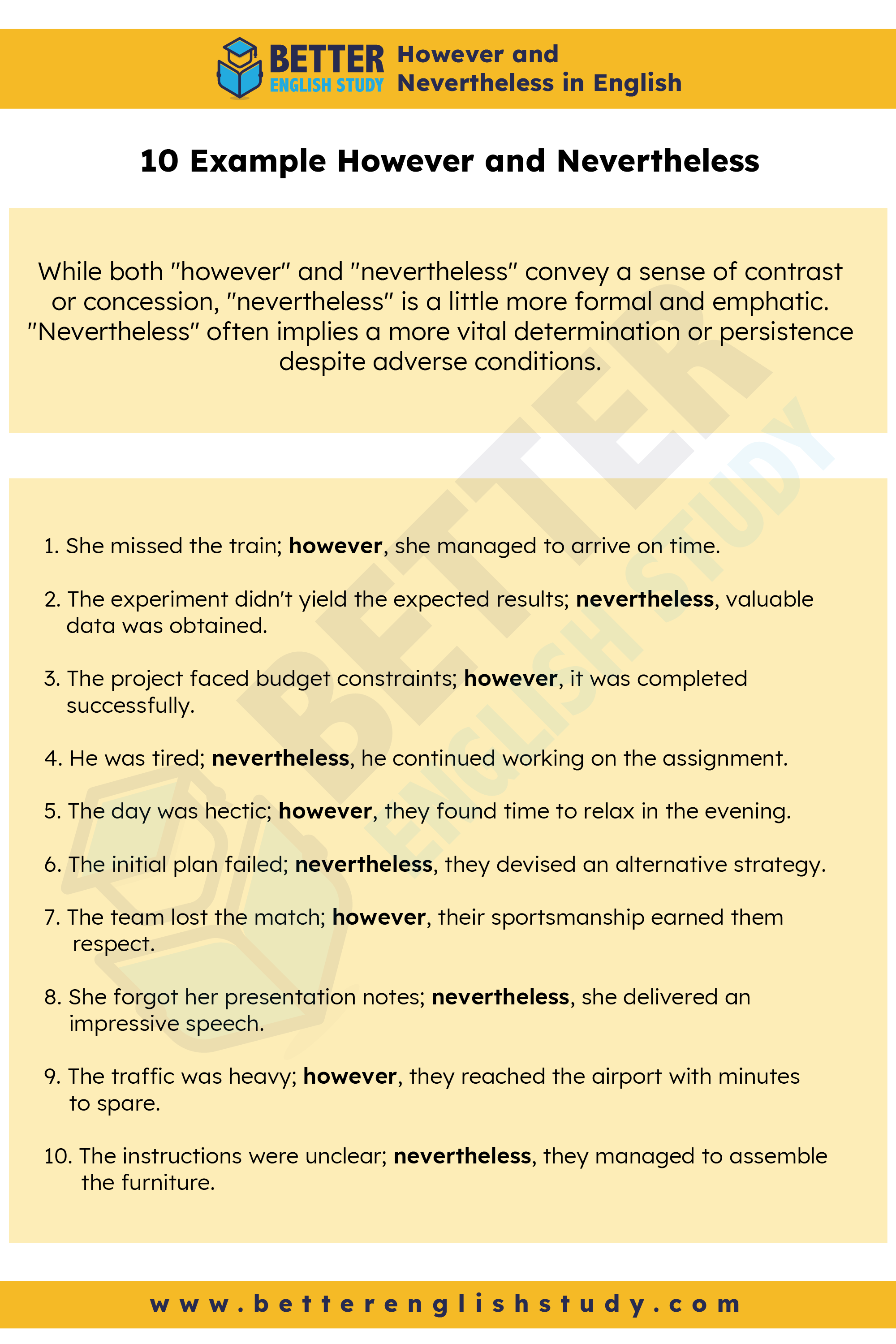
In the tapestry of the English language, transitional words play a crucial role in weaving together ideas and conveying nuanced relationships between them. “However” and “nevertheless” are two such words that often add depth and contrast to sentences.
In this article, we will explore when to use “however” and “nevertheless,” understand their differences, and provide examples showcasing their usage.
When to Use However in a Sentence
“However” is a versatile adverb that signals a contrast or contradiction to the preceding statement. It is commonly used to introduce a contrasting idea, result, or condition, offering an alternative perspective.
Example:
- She wanted to go to the party; however, she was feeling unwell.
- The initial plan failed; the team, however, quickly devised an alternative strategy.
- The project faced budget constraints; however, it was completed successfully.
When to Use Nevertheless in a Sentence
“Nevertheless” is a little more formal and emphatic than “however.” It also indicates a contrast or concession but is often used to convey a stronger sense of determination or persistence in facing obstacles.
Example:
- The weather was unfavorable; nevertheless, they decided to proceed with the outdoor event.
- He was tired; nevertheless, he continued working on the assignment.
- The experiment didn’t yield the expected results; nevertheless, valuable data was obtained.
What is the Difference Between However and Nevertheless?
While both “however” and “nevertheless” convey a sense of contrast or concession, “nevertheless” is a little more formal and emphatic. “Nevertheless” often implies a more vital determination or persistence despite adverse conditions.
Examples:
- The day was challenging; however, they found joy in small victories.
- The team lost the match; nevertheless, their sportsmanship earned them respect.
However and Nevertheless Examples
- She missed the train; however, she managed to arrive on time.
- The experiment didn’t yield the expected results; nevertheless, valuable data was obtained.
- The project faced budget constraints; however, it was completed successfully.
- He was tired; nevertheless, he continued working on the assignment.
- The day was hectic; however, they found time to relax in the evening.
- The initial plan failed; nevertheless, they devised an alternative strategy.
- The team lost the match; however, their sportsmanship earned them respect.
- She forgot her presentation notes; nevertheless, she delivered an impressive speech.
- The traffic was heavy; however, they reached the airport with minutes to spare.
- The instructions were unclear; nevertheless, they managed to assemble the furniture.
Using “however” and “nevertheless” expresses surprise or a contrasting element in a sentence. They redirect the reader or listener’s attention to an unexpected outcome or condition.
Nevertheless, it is a Little More Formal than However
“Nevertheless” is a bit more formal and often employed in written or more formal settings. It adds a touch of formality and emphasis, making it suitable for professional or academic contexts.
Examples:
- The initial proposal was met with skepticism; nevertheless, it was approved by the board.
- The task seemed daunting; nevertheless, the team approached it with meticulous planning.
- The negotiations were intricate; nevertheless, diplomats worked tirelessly to reach a consensus.
Nevertheless Basically Means “Even Though”
“Nevertheless” is synonymous with “even though” and is used to convey a sense of persistence or determination despite obstacles. It can be seen as a more formal alternative to “however.”
Examples:
- The weather forecast predicted rain; nevertheless/even though, they decided to proceed with the outdoor wedding.
- The project encountered unexpected delays; nevertheless/even though, the team continued working towards the established goals.
- The instructions were complex; nevertheless/even though, they managed to assemble the furniture without any issues.
Nevertheless and Nonetheless are Perhaps Completely Interchangeable
“Nevertheless” and “nonetheless” are indeed nearly interchangeable. Both convey a sense of contrast or concession, but “nevertheless” is more commonly used.
Examples:
- The exam was challenging; nonetheless/nevertheless, she scored exceptionally well.
- The schedule was tight; nonetheless/nevertheless, the event could have been more organized.

Nevertheless, it is Hardly Ever Used in Spoken English
Indeed, “nevertheless” is more commonly found in written or formal contexts. In everyday spoken English, people often use “however” or other alternatives like “but” or “yet” to express similar ideas.
In conclusion, the judicious use of “however” and “nevertheless” adds sophistication and nuance to your expressions. Understanding when and how to use them can elevate your writing and effectively convey contrasts or concessions in various contexts.
